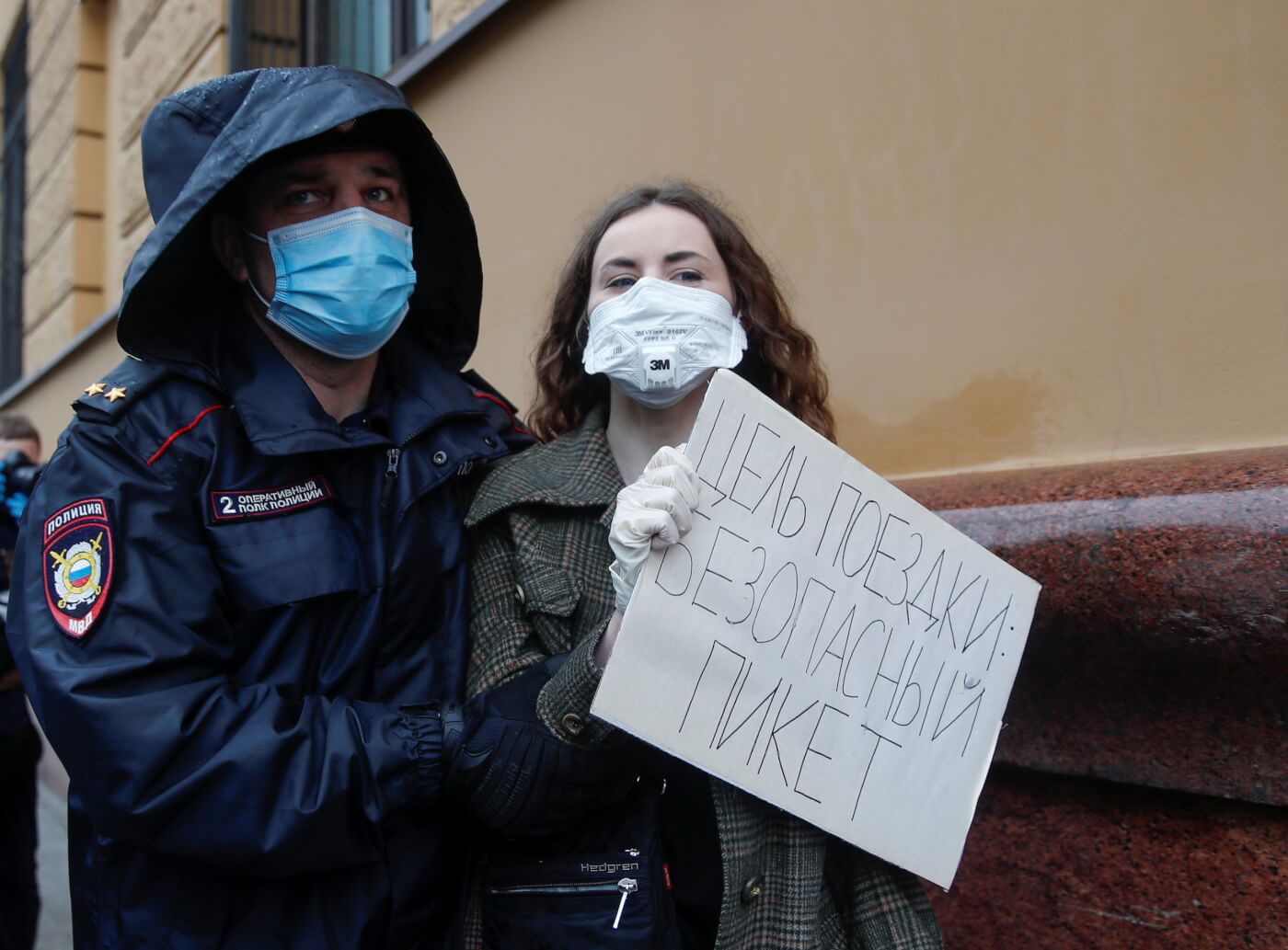A group of well-known Russian journalists was arrested in Moscow on Thursday 28 May as they took part in solitary pickets over a colleague’s arrest the week before. At least eight people were detained, including Sergey Smirnov, chief editor of MediaZona, an online outlet that covers criminal justice and police activity in Russia, and journalists Alexander Plushev and Tatyana Felgenhauer, who was stabbed in the neck by an attacker in her newsroom in 2017, of the Ekho Moskvy radio station.
Council of Europe Rights Commissioner Dunja Mijatovic said on Twitter that she was greatly dismayed and called for their release.
Greatly dismayed at the arrest of journalist Ilya Azar @A3AP & today’s detention of six journalists after attempted solitary pickets. #COVID19 cannot be an excuse to clamp down on #FreedomOfExpression.
I call upon #Russia‘s authorities to release them as a matter of urgency.
— Commissioner for Human Rights (@CommissionerHR) May 28, 2020
The OSCE Representative on Media Freedom also condemned the detentions and expressed concerns over suppression of freedom of peaceful assembly in Russia.
Alarmed by detention of several journalists, in particular Sergey Smirnov @mediazzzona, Tatyana Felgengauer @t_felg and Aleksandr Plyushchev @echomskru, in Moscow, #Russia, picketing in solidarity with their colleague Ilia Azar @novaya_gazeta. I call for their immediate release.
— OSCE media freedom (@OSCE_RFoM) May 28, 2020
The journalists detained on Thursday were taking part in single pickets – the only protest allowed without authorities’ approval. Despite warnings, solo pickets continued the next day and spread across the country. In Moscow, more than 30 protestors were detained outside the police headquarters.
All detainees have been charged with violating laws on protesting and six have also been charged with breaking the self-isolation restrictions, which could result in fines or jail time. The court hearings are expected within the next two weeks.
The protests began after Ilya Azar, a district council representative in Moscow and journalist who works for opposition newspaper Novaya Gazeta, was arrested on 26 May as he, in turn, was protesting by himself in support of Vladimir Vorontsov, a former police officer who runs an outlet dedicated to exposing abuses within law enforcement.
Vorontsov, who has worked to expose violations within Russia’s law enforcement agencies, was arrested in early May on extortion charges. He was later accused of also illegally distributing pornography and had two more charges added Friday. Vorontsov denies these charges, saying the case is politically motivated and linked to his activism. His platform, called “Police Ombudsman”, has amassed about 500,000 followers on social media.
Azar was given 15 days in jail on Thursday for breaking protest laws and police said at the time that he was being detained for violating a ban on mass gatherings during Moscow’s lockdown, meant to slow the spread of coronavirus. He was subsequently charged with “repeated violation of laws on protesting.”
“Obviously you can’t hold mass demos amid the pandemic in order to prevent further spread but a one-man protest is not a mass demo, either in its form or idea,” Azar wrote on Facebook.
Critics have been accusing police of using the Covid-19 outbreak to crack down on activists. Russia has seen one of the biggest outbreaks of coronavirus in the world, with an official number of 414,878 infections and 4,855 deaths on 1 June.
“To sum it up, using the pandemic and the general fear and apathy as cover, the people in power multiply their illegal acts,” Azar added. “They are seriously discussing holding the military parade in June but I will be punished for a one-person demo.”
The head of the Russian branch of Amnesty International, Natalya Zvyagina, called the arrests “a cowardly” move against civil rights activists.
“The authorities hypocritically limit public events under the pretext of the pandemic by arresting solo demonstrators who do not pose a threat to anyone but the authorities as their abuses are being uncovered,” Zvyagina said in a statement Thursday. “The demonstrators are being thrown into overcrowded cells where they are risking getting infected with Covid-19.”
Earlier this spring, the World Health Organisation and other expert international bodies such as the UN Sub-Committee on the Prevention of Torture, said that governments should minimise the number of people in custody during the pandemic.
Opposition leader Alexei Navalny complained that Azar had had every right to carry out his original protest “according to the law, constitution, and common sense. None of these three things exists in Russia right now”.

